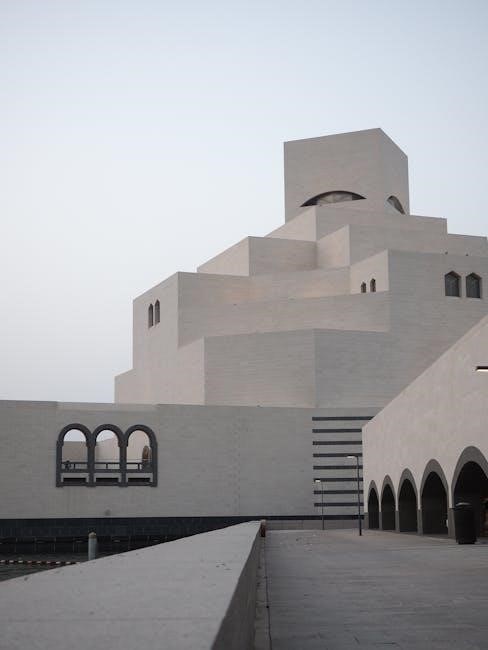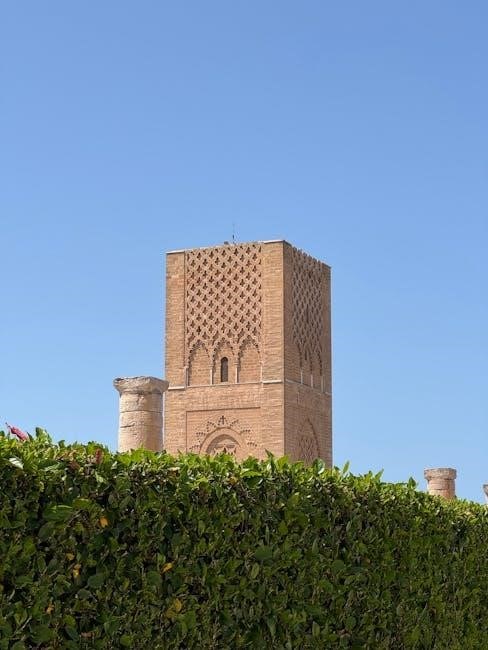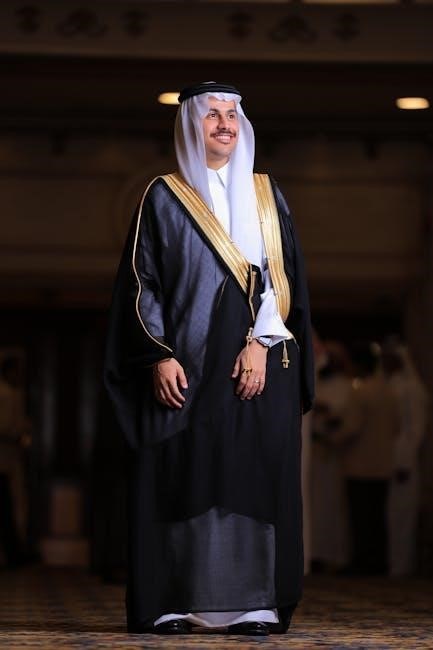The importance of Arabic in global financial and business contexts is growing, driven by Arab nations’ economic influence and Islamic finance principles. Understanding key financial terms and currency exchange dynamics, such as EUR/MYR rates, is crucial for international trade and investment strategies in the Arab world.
Overview of the Importance of Arabic in Financial and Business Contexts
The importance of Arabic in financial and business contexts is underscored by the growing influence of Arab nations in global economics. Arabic is pivotal for conducting trade, understanding legal frameworks, and navigating cultural nuances in Arab markets. The language facilitates communication in regions with significant economic potential, such as the Gulf Cooperation Council (GCC) countries. Additionally, Arabic is essential for engaging with Islamic finance principles, which are gaining global traction. As international businesses expand into Arab markets, proficiency in Arabic ensures better negotiation, compliance, and relationship-building. The language also plays a crucial role in accessing key financial documents, contracts, and regulatory information in Arab countries, making it indispensable for professionals in finance and business.
Key Concepts in Financial and Business Terminology in Arabic
Understanding key financial and business terminology in Arabic is essential for professionals engaging with Arab markets. Terms like مالية (maliyah) (finance) and استثمار (istithmar) (investment) are fundamental. Concepts such as العقود (uqud) (contracts) and القانون التجاري (al-qanun al-tijari) (commercial law) are critical for legal compliance. Additionally, knowledge of التحليل المالي (al-tahlil al-mali) (financial analysis) and الإدارة المالية (al-idarah al-maliyah) (financial management) aids in decision-making. The ability to interpret البلاتة (al-bilatah) (invoices) and التقرير المالي (al-taqrir al-mali) (financial reports) is vital for transparency. Mastery of these concepts ensures effective communication and operational efficiency in Arab financial and business environments, facilitating international trade and investment activities.

Financial Systems and Regulations in Arab Countries
Arab countries maintain robust financial systems regulated by central banks, ensuring monetary stability and economic growth through tailored policies and legal frameworks.
Islamic Finance and its Principles
Islamic finance operates based on the principles of Sharia law, emphasizing fairness, transparency, and the prohibition of interest (Riba). It avoids practices like Gharar (uncertainty) and Maisir (gambling), ensuring ethical and socially responsible financial activities. Key instruments include Mudarabah (profit-sharing partnerships) and Murabahah (cost-plus financing). Islamic finance prioritizes asset-backed transactions, aligning investments with real economic activities. The sector also promotes risk-sharing between parties, fostering a more equitable financial ecosystem; Sukuk (Islamic bonds) and Takaful (Islamic insurance) are prominent tools. Sharia boards oversee compliance, ensuring all operations adhere to moral and legal standards. This approach attracts both Muslim and non-Muslim investors seeking sustainable and values-driven financial solutions.
Banking Systems in Arab Nations
The banking systems in Arab nations are diverse, combining conventional and Islamic finance practices. Central banks regulate monetary policies, maintain financial stability, and oversee commercial banks. Many Arab countries have adopted advanced digital banking solutions, enhancing customer experiences. Islamic banking, operating under Sharia principles, is prominent alongside traditional banking. Financial inclusion initiatives are expanding access to banking services. The sector faces challenges like geopolitical risks and economic volatility. Arab nations are increasingly integrating global financial systems while preserving regional financial stability. These systems play a vital role in supporting economic development and fostering regional trade.

Capital Markets and Investments in the Arab World
Capital markets in the Arab world have grown significantly, offering diverse investment opportunities. Stock exchanges such as the Dubai Financial Market and Saudi Tadawul play pivotal roles in driving market expansion. Financial liberalization and economic reforms have enhanced the region’s appeal to foreign investors. The rise of technology, renewable energy, and infrastructure sectors has attracted substantial investments. Sovereign wealth funds and private equity firms are key players, fostering innovation and growth. However, challenges like market volatility and geopolitical risks remain. The region’s strategic location and abundant natural resources make it a promising destination for long-term investments, contributing to economic diversification and sustainable development across Arab nations.

Currency Exchange and Financial Transactions
Currency exchange is vital for global trade, enabling cross-border transactions. Financial transactions rely on accurate exchange rates, impacting trade balances and economic stability worldwide.
Understanding Euro to Malaysian Ringgit (EUR/MYR) Exchange Rates
The Euro to Malaysian Ringgit (EUR/MYR) exchange rate represents the value of the euro in terms of the Malaysian Ringgit. This rate is influenced by economic indicators, trade relations, and geopolitical events. Businesses and investors closely monitor EUR/MYR fluctuations to make informed decisions on international trade and investments. Understanding this exchange rate is crucial for companies operating in diverse markets, as it impacts revenue, costs, and profitability. Additionally, the EUR/MYR rate reflects broader economic trends, making it a key tool for financial planning and risk management in global transactions.
Role of Currency Converters in International Trade

Currency converters play a vital role in international trade by enabling businesses to accurately convert currencies for transactions. They provide real-time exchange rate data, ensuring precise calculations for imports, exports, and investments. These tools are essential for determining pricing strategies and assessing profitability. Additionally, currency converters help mitigate risks associated with exchange rate fluctuations by offering historical data for analysis. Many platforms also provide forward contract options, allowing businesses to lock in rates for future transactions. This functionality is particularly valuable for SMEs and multinational corporations operating in diverse markets. By streamlining currency conversion processes, these tools enhance efficiency and reduce errors in global trade operations.
Impact of Exchange Rate Fluctuations on Business
Exchange rate fluctuations significantly influence business operations, particularly in international trade. Changes in currency values can affect profitability, as import and export costs may rise or fall unpredictably. For instance, a weaker local currency can make exports more competitive but increase the cost of imported goods. Businesses must adapt their pricing strategies and financial planning to mitigate these risks. Fluctuations also impact cash flow management and investment decisions. Companies may opt for hedging strategies, such as forward contracts, to stabilize their financial positions. Real-time monitoring of exchange rates is crucial for businesses to respond effectively to market changes. Additionally, currency volatility can alter consumer demand and affect profitability margins, making it essential for firms to develop flexible strategies to navigate these challenges.
Investment Strategies in Arab Markets
Investment strategies in Arab markets focus on diversification, sector-specific opportunities, and alignment with economic reforms. Key sectors include energy, technology, and infrastructure, driven by regional growth initiatives.
Opportunities for Foreign Investment in Arab Countries
Foreign investors are increasingly drawn to Arab countries due to their strategic location, abundant natural resources, and growing economies. Sectors such as renewable energy, infrastructure, and technology present lucrative opportunities. The Arab world’s focus on diversification and economic reforms has created a favorable environment for foreign capital. Countries like the UAE and Saudi Arabia are leading in attracting investments through mega-projects and free trade zones. Additionally, the rise of digital transformation and e-commerce in the region offers promising avenues. With government incentives and tax breaks, foreign businesses can capitalize on the region’s potential for growth and innovation, making Arab markets an attractive destination for global investors seeking diversification and high returns.
Risks and Challenges in Arab Financial Markets
Risks and Challenges in Arab Financial Markets
Investing in Arab financial markets comes with unique risks and challenges. Geopolitical instability and regional conflicts can create uncertainty, impacting market stability. Currency fluctuations and dependence on oil prices pose significant risks, as many Arab economies rely heavily on hydrocarbon exports. Regulatory frameworks vary across countries, and bureaucratic processes can be complex. Political and economic reforms, while progressive, may face resistance, affecting investor confidence. Additionally, challenges such as corruption and transparency issues in some regions can hinder business operations. Despite these obstacles, many Arab nations are implementing reforms to improve governance and attract foreign investment, making it essential for investors to conduct thorough due diligence before entering these markets.
Case Studies of Successful Investments in the Arab World
The Arab World has witnessed remarkable success stories in investments, showcasing opportunities and growth potential. For instance, the UAE’s real estate sector has attracted global investors, with projects like Dubai’s Expo 2020 driving economic growth. Saudi Arabia’s Vision 2030 has also drawn significant investments in infrastructure and tourism, positioning the kingdom as a hub for innovation. Similarly, Jordan’s technology sector has flourished, with startups in Amman gaining international recognition. Qatar’s investments in energy and sports infrastructure, including the 2022 FIFA World Cup, highlight successful long-term strategies. These case studies demonstrate how aligning investments with national visions and leveraging regional strengths can yield substantial returns, encouraging foreign investors to explore the Arab market’s diverse opportunities.

Regional Economic Policies and Cooperation
Regional economic policies in the Arab World focus on fostering collaboration, trade, and investment among member states, driven by organizations like the Arab League.
Role of the Arab League in Economic Affairs
The Arab League plays a pivotal role in promoting economic collaboration among its member states, fostering regional stability and development. Established in 1945, it aims to enhance economic integration through initiatives like the Arab Common Market and customs unions. The League facilitates trade agreements, reducing barriers and enhancing intra-regional commerce. It also supports infrastructure projects and economic reforms, addressing disparities between member states. By promoting sectoral cooperation in agriculture, industry, and energy, the Arab League strengthens economic ties. Additionally, it advocates for collective responses to global economic challenges, ensuring a unified Arab stance in international forums. While progress is often hindered by political instability, the League remains a key platform for advancing regional economic interests and sustainable development.
Economic Agreements and Collaborations Between Arab Nations
Economic agreements and collaborations among Arab nations are essential for fostering regional prosperity and integration. Initiatives like the Greater Arab Free Trade Area (GAFTA) aim to eliminate tariffs and promote intra-regional trade. The Arab Customs Union further seeks to harmonize customs procedures, enhancing economic unity. Bilateral agreements between countries, such as partnerships in energy and infrastructure, strengthen economic ties. Collaborative projects, like joint ventures in renewable energy and transportation, reflect a shared commitment to sustainable development. These efforts not only boost economic growth but also enhance regional stability. However, challenges like varying economic policies and geopolitical tensions sometimes hinder progress. Despite these obstacles, economic collaborations remain a cornerstone of Arab nations’ collective development strategies.
Impact of Political Stability on Economic Growth
Political stability plays a crucial role in driving economic growth across Arab nations. A stable political environment fosters investor confidence, attracts foreign investment, and encourages long-term economic planning. Stable governments are more likely to implement consistent policies, promoting infrastructure development and innovation. This, in turn, enhances productivity and job creation, leading to higher GDP growth rates. Conversely, political instability discourages investment, disrupts trade, and hampers economic progress. Arab countries experiencing prolonged instability often face challenges in achieving sustainable development. Therefore, maintaining political stability is essential for creating a favorable business climate and ensuring economic prosperity in the region. Efforts to strengthen governance and reduce conflicts are vital for unlocking the full economic potential of Arab nations.

Emerging Trends in Arab Financial Markets
Emerging trends in Arab financial markets include the rapid growth of FinTech, digital banking, and sustainable investments, driven by technological advancements and evolving investor preferences.
Digital Transformation in Banking and Finance

Digital transformation is revolutionizing banking and finance in Arab markets, with a strong focus on online and mobile banking solutions. Banks are leveraging advanced technologies like blockchain, artificial intelligence, and big data analytics to enhance customer experiences and operational efficiency.
The adoption of digital payment systems and fintech platforms is rising rapidly, driven by increasing internet penetration and smartphone usage. Additionally, financial institutions are investing in cybersecurity measures to protect against evolving threats and maintain customer trust.
This shift is also enabling personalized financial services, such as tailored investment advice and real-time transaction monitoring, catering to the diverse needs of both individual and corporate clients. However, challenges like regulatory frameworks and digital literacy remain key hurdles.
Overall, digital transformation is reshaping the financial landscape, fostering innovation and competitiveness in the Arab banking sector. Collaborations with fintech startups are further accelerating this progress, ensuring sustainable growth in the digital age.
Role of Cryptocurrencies in Arab Financial Systems
Cryptocurrencies, such as Bitcoin and Ethereum, are gradually gaining traction in Arab financial systems, offering decentralized alternatives to traditional banking. They facilitate faster and cheaper cross-border transactions, which is particularly beneficial for international trade and remittances in the region.

However, the adoption of cryptocurrencies in Arab countries faces regulatory challenges. Some nations, like the UAE, have embraced crypto with progressive regulations, while others remain cautious due to concerns over security and compliance with Islamic finance principles.
Despite these hurdles, cryptocurrencies are seen as tools for financial inclusion, especially in underserved markets. Their role is expected to grow as Arab nations explore blockchain technology to enhance transparency and efficiency in financial systems.
Sustainable Investing and ESG Principles in Arab Markets
Sustainable investing and ESG (Environmental, Social, and Governance) principles are increasingly influential in Arab markets, aligning with global trends toward responsible investment. Investors in the Arab region are prioritizing companies that demonstrate strong ESG performance, driven by growing awareness of climate change, social equity, and governance transparency.
Arab nations are integrating ESG frameworks into their financial systems, with countries like the UAE and Saudi Arabia leading the charge. Regulatory bodies are encouraging companies to disclose ESG metrics, fostering accountability and attracting international investors.
The alignment of ESG principles with Islamic finance values further accelerates adoption in Arab markets. Sustainable practices in sectors like renewable energy and infrastructure are gaining traction, supported by initiatives from organizations like the Arab League.
Future Outlook for Financial and Business Affairs in the Arab World
The Arab World’s financial future looks promising, with technological advancements and sustainability driving growth. The GCC’s diversification strategies and Vision 2030 initiatives are key catalysts for progress.

Forecast for Economic Growth and Development
The Arab region is anticipated to experience steady economic growth, driven by diversification strategies and increasing foreign investments. Countries like UAE and Saudi Arabia are leading with ambitious plans such as Vision 2030, focusing on non-oil sectors and innovation. Renewable energy projects and technological advancements are expected to bolster GDP growth. Regional collaborations, such as the Arab League’s economic integration efforts, will further enhance trade and development. However, challenges like geopolitical tensions and fiscal reforms must be addressed to sustain progress. Experts predict a gradual acceleration in growth rates, supported by improved governance and private sector participation, aligning the Arab World with global sustainable development goals.
Challenges and Opportunities in the Post-Pandemic Era
The COVID-19 pandemic presented significant challenges to Arab economies, including disrupted supply chains, reduced consumer spending, and increased public debt. However, it also accelerated digital transformation, fostering innovation and the adoption of new technologies. Businesses that quickly adapted to online platforms and contactless services gained a competitive edge. Additionally, the pandemic highlighted the importance of diversification and resilience in economic strategies. Post-pandemic recovery efforts have created opportunities for investments in healthcare infrastructure and renewable energy, aligning with global sustainability trends. Collaborative efforts between governments and private sectors are essential to overcome lingering challenges and capitalize on emerging opportunities, ensuring robust and inclusive economic growth in the Arab region.
Role of Technology in Shaping Future Financial Systems
Technology is revolutionizing financial systems in the Arab world, driving efficiency, transparency, and accessibility. Blockchain technology is enabling secure and decentralized transactions, while artificial intelligence enhances risk management and customer service. Mobile banking and digital wallets are becoming increasingly popular, fostering financial inclusion. Additionally, fintech innovations are streamlining payments, reducing costs, and improving user experiences. However, the rapid pace of technological change also presents challenges, such as cybersecurity threats and the need for robust regulatory frameworks. As digital transformation accelerates, Arab nations are investing in infrastructure and talent to stay competitive. The integration of advanced technologies promises to create a more dynamic and resilient financial ecosystem, positioning the region as a leader in global finance.
The discussion highlights the significance of Arabic in financial and business contexts, emphasizing its role in facilitating trade and investment across Arab nations. Key financial systems, such as Islamic banking and capital markets, were explored, along with their unique principles and regulations. The impact of exchange rates and currency converters on international trade was also addressed. Investment opportunities in Arab markets, including risks and success stories, provided insights into the region’s economic landscape. Regional cooperation, political stability, and emerging trends like digital transformation and sustainable investing were key themes. The future outlook underscores the importance of technology and innovation in shaping the Arab financial sector, ensuring continued growth and adaptation to global challenges.
Final Thoughts on the Evolution of Financial and Business Affairs in Arabic
The evolution of financial and business affairs in Arabic reflects a dynamic interplay between tradition and modernity. Arabic, as a cornerstone of communication, has facilitated trade and investment across the Arab world, bridging cultural and economic gaps. The integration of Islamic finance, digital banking, and sustainable practices underscores the region’s adaptability to global trends. As technology advances, Arabic financial systems are poised to embrace innovation, ensuring resilience and growth. The balance between preserving cultural identity and embracing global economic shifts will define the future trajectory of Arab financial markets, positioning them as a vital player in the global economy.

Leave a Reply
You must be logged in to post a comment.